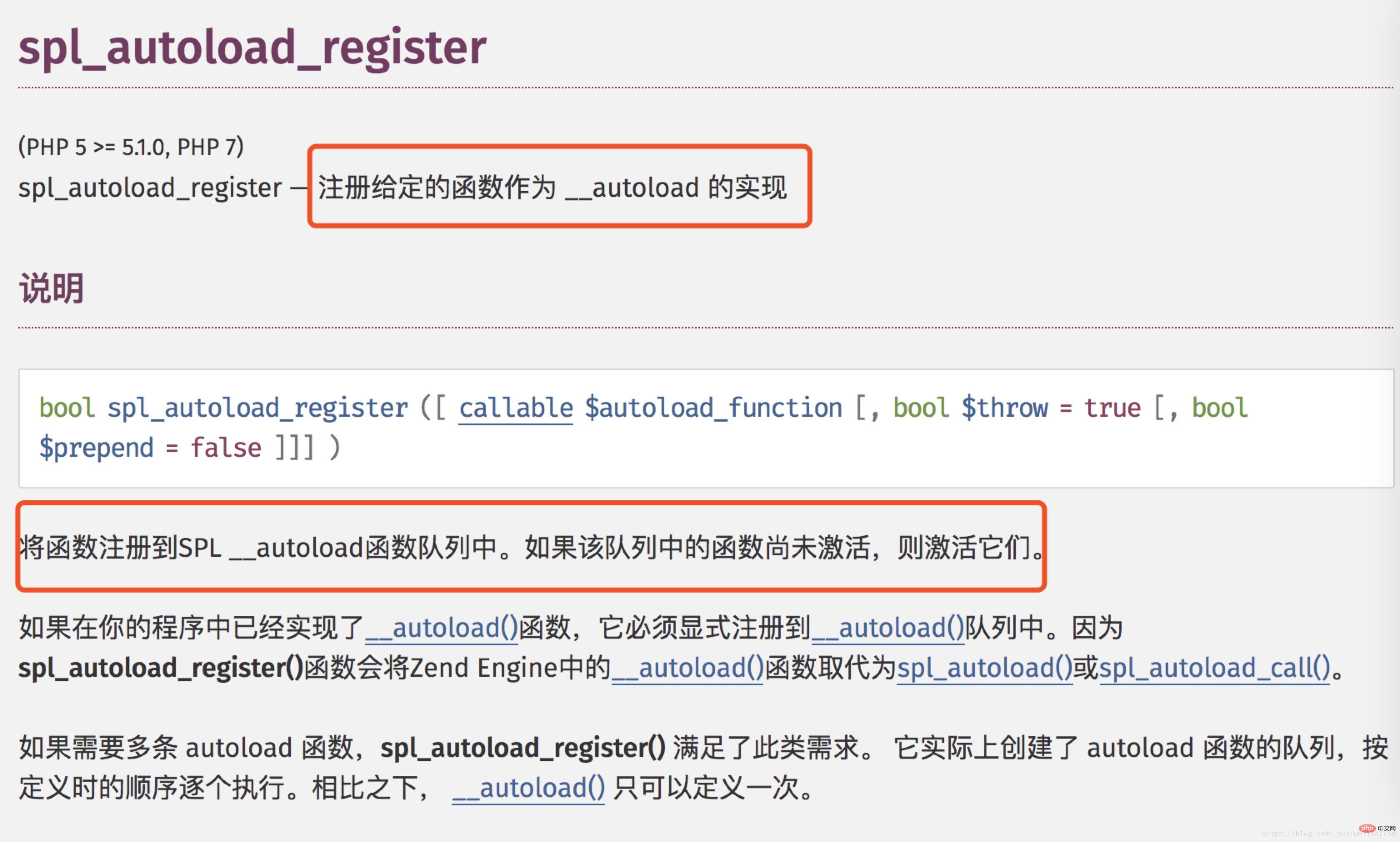#来一波代码,印象深刻一些:
//文件 testClass.php ,即将new的类
class TestClass{
public function __construct() {
echo '你已经成功new了我了';
}
}
//文件autoloadDemo.php文件
spl_autoload_register('autoLoad_function', true, true);
function autoLoad_function($class_name){
echo "所有的require或者include文件工作都交给我吧!\r\n";
$class_filename = "./{$class_name}.php";
echo "我来加载{$class_filename}文件\r\n";
require_once("./{$class_name}.php");
}
$obj_demo = new TestClass(); ログイン後にコピー
输出:
所有的require或者include文件工作都交给我吧!
我来加载testClass.php文件
你已经成功new了我了 ログイン後にコピー
明白了这个加载的原理,看下文就顺利多了。
2.composer update发生的故事
将自动加载之前,必须要先说一下composer update,这里头承载了自动加载的前提。
composer项目都包含一个composer.json的配置文件。
psr-4:说明是基于psr-4规范的类库,都支持自动加载,只要在后面的对象中以**“命名空间:路径”**的方式写入自己的类库信息即可。
按照以上配置每回composer update之后呢,都会更新一个很重要的文件:./vender/composer/autoload_psr4.php。
这个文件只做了一件事情:把命名空间和文件路径对应起来,这样后续自动加载就有映射根据了。
3.追踪一下composer的自动加载
composer的故事从唯一的一个require说起:
require '../vendor/autoload.php' ログイン後にコピー
这个脚本执行了一个函数:
ComposerAutoloaderInitd9b31141b114fcbee3cf55d0e97b7f87::getLoader() ログイン後にコピー
继续跟getloader函数做了什么?
public static function getLoader() {
if (null !== self::$loader) {
return self::$loader;
}
spl_autoload_register(array('ComposerAutoloaderInitd9b31141b114fcbee3cf55d0e97b7f87', 'loadClassLoader'), true, true);
self::$loader = $loader = new \Composer\Autoload\ClassLoader();
spl_autoload_unregister(array('ComposerAutoloaderInitd9b31141b114fcbee3cf55d0e97b7f87', 'loadClassLoader'));
$useStaticLoader = PHP_VERSION_ID >= 50600 && !defined('HHVM_VERSION') && (!function_exists('zend_loader_file_encoded') || !zend_loader_file_encoded());
if ($useStaticLoader) {
require_once __DIR__ . '/autoload_static.php';
call_user_func(\Composer\Autoload\ComposerStaticInitd9b31141b114fcbee3cf55d0e97b7f87::getInitializer($loader));
} else {
$map = require __DIR__ . '/autoload_namespaces.php';
foreach ($map as $namespace => $path) {
$loader->set($namespace, $path);
}
$map = require __DIR__ . '/autoload_psr4.php';
foreach ($map as $namespace => $path) {
$loader->setPsr4($namespace, $path);
}
$classMap = require __DIR__ . '/autoload_classmap.php';
if ($classMap) {
$loader->addClassMap($classMap);
}
}
$loader->register(true);
if ($useStaticLoader) {
$includeFiles = Composer\Autoload\ComposerStaticInitd9b31141b114fcbee3cf55d0e97b7f87::$files;
} else {
$includeFiles = require __DIR__ . '/autoload_files.php';
}
foreach ($includeFiles as $fileIdentifier => $file) {
composerRequired9b31141b114fcbee3cf55d0e97b7f87($fileIdentifier, $file);
}
return $loader;
} ログイン後にコピー
这个函数主要做了两件事情:
继续跟踪register做了什么:
public function register($prepend = false) {
spl_autoload_register(array($this, 'loadClass'), true, $prepend);
} ログイン後にコピー
原来调用了spl_autoload_register函数,当类没加载的时候使用loadClass来加载类。(这个前文讲的很清楚了,应该很熟了)
继续跟踪loadClass实现:
public function loadClass($class) {
if ($file = $this->findFile($class)) {
includeFile($file);
return true;
}
} ログイン後にコピー
大概可以看出,是做了文件的include。
public function findFile($class) {
// class map lookup
if (isset($this->classMap[$class])) {
return $this->classMap[$class];
}
if ($this->classMapAuthoritative || isset($this->missingClasses[$class])) {
return false;
}
if (null !== $this->apcuPrefix) {
$file = apcu_fetch($this->apcuPrefix.$class, $hit);
if ($hit) {
return $file;
}
}
$file = $this->findFileWithExtension($class, '.php');
// Search for Hack files if we are running on HHVM
if (false === $file && defined('HHVM_VERSION')) {
$file = $this->findFileWithExtension($class, '.hh');
}
if (null !== $this->apcuPrefix) {
apcu_add($this->apcuPrefix.$class, $file);
}
if (false === $file) {
// Remember that this class does not exist.
$this->missingClasses[$class] = true;
}
return $file;
} ログイン後にコピー
这个函数做了一件事:就是寻找类从上文的autoload_xxx.php初始化的数据中来寻找映射的文件路径。
继续跟踪findFileWithExtension:
private function findFileWithExtension($class, $ext) {
// PSR-4 lookup
$logicalPathPsr4 = strtr($class, '\\', DIRECTORY_SEPARATOR) . $ext;
$first = $class[0];
if (isset($this->prefixLengthsPsr4[$first])) {
$subPath = $class;
while (false !== $lastPos = strrpos($subPath, '\\')) {
$subPath = substr($subPath, 0, $lastPos);
$search = $subPath.'\\';
if (isset($this->prefixDirsPsr4[$search])) {
$pathEnd = DIRECTORY_SEPARATOR . substr($logicalPathPsr4, $lastPos + 1);
foreach ($this->prefixDirsPsr4[$search] as $dir) {
if (file_exists($file = $dir . $pathEnd)) {
return $file;
}
}
}
}
}
// PSR-4 fallback dirs
foreach ($this->fallbackDirsPsr4 as $dir) {
if (file_exists($file = $dir . DIRECTORY_SEPARATOR . $logicalPathPsr4)) {
return $file;
}
}
// PSR-0 lookup
if (false !== $pos = strrpos($class, '\\')) {
// namespaced class name
$logicalPathPsr0 = substr($logicalPathPsr4, 0, $pos + 1)
. strtr(substr($logicalPathPsr4, $pos + 1), '_', DIRECTORY_SEPARATOR);
} else {
// PEAR-like class name
$logicalPathPsr0 = strtr($class, '_', DIRECTORY_SEPARATOR) . $ext;
}
if (isset($this->prefixesPsr0[$first])) {
foreach ($this->prefixesPsr0[$first] as $prefix => $dirs) {
if (0 === strpos($class, $prefix)) {
foreach ($dirs as $dir) {
if (file_exists($file = $dir . DIRECTORY_SEPARATOR . $logicalPathPsr0)) {
return $file;
}
}
}
}
}
// PSR-0 fallback dirs
foreach ($this->fallbackDirsPsr0 as $dir) {
if (file_exists($file = $dir . DIRECTORY_SEPARATOR . $logicalPathPsr0)) {
return $file;
}
}
// PSR-0 include paths.
if ($this->useIncludePath && $file = stream_resolve_include_path($logicalPathPsr0)) {
return $file;
}
return false;
} ログイン後にコピー
这个函数做了件事:将命名空间\类这样的类名,转换成目录名/类名.php这样的路径,再从前文setPsr4设置的映射信息中寻找映射信息,然后完成返回路径。
至此composer的自动加载机制结束。

 そうですか?無知のようですね?
そうですか?無知のようですね?